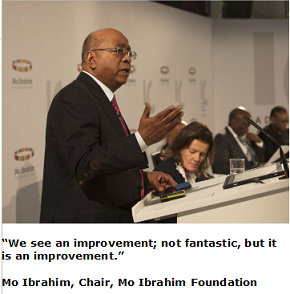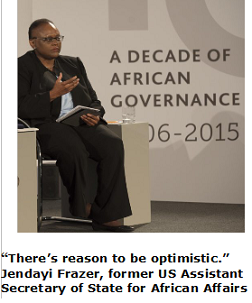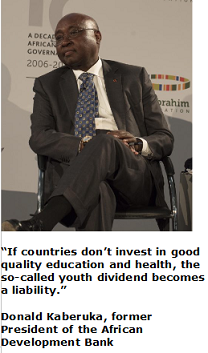 ReConnect Africa is a unique website and online magazine for the African professional in the Diaspora. Packed with
essential information about careers, business and jobs, ReConnect Africa keeps you connected to the best of Africa.
ReConnect Africa is a unique website and online magazine for the African professional in the Diaspora. Packed with
essential information about careers, business and jobs, ReConnect Africa keeps you connected to the best of Africa.


The recently launched 2016 Ibrahim Index lauds a decade of overall progress in African governance while highlighting the risks for security and development on the continent. Read more..
 2016 Ibrahim Index lauds a decade of overall progress in African governance while highlighting risks
2016 Ibrahim Index lauds a decade of overall progress in African governance while highlighting risks“Everybody needs good governance, not just Africa,” said Mo Ibrahim at the launch of the 2016 Ibrahim Index of African Governance (IIAG).
The Index, recently launched by the Mo Ibrahim Foundation, reveals that improvement in overall governance in Africa over the past ten years has been held back by a widespread deterioration in the category of Safety & Rule of Law.
The Ibrahim Index of African Governance (IIAG) provides an annual assessment of the quality of governance in African countries and is the most comprehensive collection of data on African governance. The 2016 IIAG combines 95 indicators from 34 independent African and global data institutions.
The 2016 IIAG Report by the Foundation, established in 2006 with a focus on the critical importance of leadership and governance in Africa by providing tools to assess and support progress in leadership and governance, analyses trends over the last decade, covering the ten-year period 2006-2015. It covers 54 African countries. Sudan and South Sudan were included in the IIAG for the first time in the 2015 IIAG report and there are no data for South Sudan prior to its secession in 2011.
Most Comprehensive Analysis of African Governance to Date
The tenth edition of the IIAG, the most comprehensive analysis of African governance undertaken to date, brings together a decade of data to assess each of Africa’s 54 countries against 95 indicators drawn from 34 independent sources. This year, for the first time, the IIAG includes Public Attitude Survey data from Afrobarometer. This captures Africans’ own perceptions of governance, which provide fresh perspective on the results registered by other data such expert assessment and official data.
Over the last decade, overall governance has improved by one score point at the continental average level, with 37 countries – home to 70% of African citizens – registering progress.
Over the last decade, overall governance has improved by one score point at the continental average level, with 37 countries – home to 70% of African citizens – registering progress. This overall positive trend has been led mainly by improvement in Human Development and Participation & Human Rights. Sustainable Economic Opportunity also registered an improvement, but at a slower pace.
“We see an improvement; not fantastic, but it is an improvement,” said Mo Ibrahim, Chair of the Mo Ibrahim Foundation, at the launch, adding, “Improvement is not enough.”
Understanding why is crucial, says Ibrahim. “Africa is 54 stories; each country has its own story and we can’t be lazy and use a broad brush. We need more nuance in the way we describe Africa.”

Indeed, these positive trends stand in contrast to a pronounced and concerning drop in Safety & Rule of Law, for which 33 out of the 54 African countries – home to almost two-thirds of the continent’s population – have experienced a decline since 2006, 15 of them quite substantially. This decline in personal safety and national security has pulled down the overall score of the continent.
Pointing out the strong correlation between safety and the rule of law and development, Ibrahim pointed out that “We need peace in Africa; conflicts are destroying our development and our future. This is an important message.”
This worrying trend has worsened recently, with almost half of the countries on the continent recording their worst score ever in this category within the last three years. This is driven by large deteriorations in the sub-categories of Personal Safety and National Security. Notably, Accountability is now the lowest scoring sub-category of the whole Index. Without exception, all countries that have deteriorated at the Overall Governance level have also deteriorated in Safety & Rule of Law.
Remarking on these findings at the launch, former US Assistant Secretary of State for African Affairs, Jendayi Frazer, pointed out that the data showed that non-state actors such as Boko Haram were the cause of much of the decline, highlighting that some countries have not yet built strong enough state structures to protect their citizens. Africa has 52 cities with a population of more than one million people, and this rapid urbanisation is contributing to the strain on security resources. Urging a course away from “heavy-handed intervention”, she stated that the goal for countries must be “a negotiated solution which, in the longer term, gives the capacity for improvement even if, short-term, it is not as satisfactory.”
Almost two-thirds of African citizens live in a country in which safety and rule of law deteriorated in the last ten years.
mprovement in the Participation & Human Rights category, found in 37 countries across the continent, has been driven by progress in Gender and in Participation. However, a marginal deterioration appears in the sub-category Rights, with some worrying trends in indicators relating to the civil society space.

Sustainable Economic Opportunity is the IIAG’s lowest scoring and slowest improving category. However, 38 countries – together accounting for 73% of continental GDP – have recorded an improvement over the last decade. The largest progress has been achieved in the sub-category Infrastructure, driven by a massive improvement in the indicator Digital & IT Infrastructure, the most improved of all 95 indicators. However, the average score for Infrastructure still remains low, with the indicator Electricity Infrastructure registering a particularly worrying decline in 19 countries, home to 40% of Africa’s population. Progress has also been achieved in Rural Sector sub-category.
Improving the quality of education is critical to the continent’s progress and to harnessing the demographic dividend presented by Africa’s youth, said Donald Kaberuka, former President of the African Development Bank, who was also present at the launch of the report.
“If countries don’t invest in good quality education and health, the so-called youth dividend becomes a liability.”
Citing the challenge of population growth in ensuring health and education, he added that keeping the youth alive and providing an education is what will then create a dividend.
“The Index and the data allow us to be more granular in our analysis,” said Frazer, “and if you look at all four pillars, there’s reason to be optimistic.”
While the issue of gender is one of the most improved, said Ibrahim, “Africa comes from a very low base. We still have a problem here and our leaders need to take a lead and not ride populist waves.”
“We need peace in Africa; conflicts are destroying our development and our future. This is an important message.”
“The improvement in overall governance in Africa over the last decade reflects a positive trend in a majority of countries and for over two-thirds of the continent’s citizen,” says Mo Ibrahim. “No success, no progress can be sustained without constant commitment and effort. As our Index reveals, the decline in safety and rule of law is the biggest issue facing the continent today. Sound governance and wise leadership are fundamental to tackling this challenge, sustaining recent progress and ensuring that Africa’s future is bright.”
Key findings of the 2016 IIAG include:
visit mo.ibrahim.foundation/iiag for further details.
